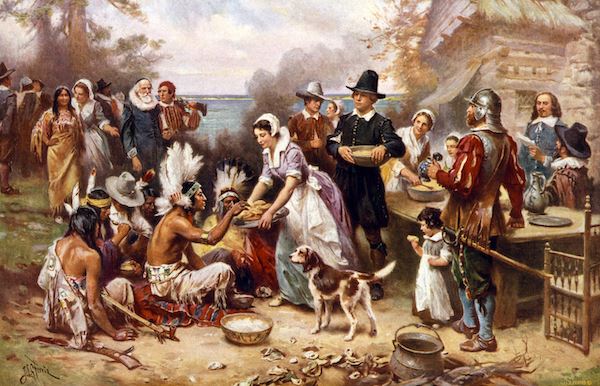
Most every schoolchild in the U.S. has heard the story about the First Thanksgiving celebrated in Plimoth, Massachusetts.
NOTE #1: It wasn't the first Thanksgiving held in North America but that is another story for another time...
Most school children are taught that the first Thanksgiving was held in 1621 with the Pilgrims and Indians holding a feast that celebrated the bountiful harvest of the first summer in the New World.
Note #2: The people we call "Pilgrims"never used that word to describe themselves, but that is another story for another time...
The previous year, the (so-called) Pilgrims sailed to North America aboard the Mayflower. The story told to schoolchildren is that the Pilgrims were originally members of the English Separatist Church (a Puritan sect). Well, that story is mostly true. However, it seems that most of the people on board the Mayflower were non-Pilgrims, non-Separatists who were hired to protect the company’s interests. Only about one-third of the original colonists were Separatists in search of religious freedom.
While all the Mayflower passengers did suffer through a terrible winter in their first few months in what is now called Plymouth, the springtime planting resulted in an excellent harvest in the late summer and early autumn. In addition, members of the small community had excellent luck in obtaining meat and fish as the forests and the sea was well stocked. The Native Americans also helped greatly in helping the new settlers learn how to hunt, fish, and also to cultivate crops.
It seems the Native Americans weren't always so friendly, however. In addition, this wasn't the first encounter the natives had with Europeans. Adventurers, fishermen, and an occasional pirate had been sailing up and down the east coast of North America for many years and often had met with Native Americans.
Earlier visitors and immigrants included the Spanish in 1565, English settlers in Roanoke in the 1580s, the English settlement Jamestown in 1607, an English settlement on the coast of what is now Maine in 1607 and 1608 (which then failed and was abandoned), and probably numerous others that were not well documented or remembered.
In 1605, the French explorer Samuel de Champlain sailed past the site the Pilgrims would later colonize and noted that there were "a great many cabins and gardens." He even provided a drawing of the region, which depicted small Native towns surrounded by fields. Captain John Smith, who coined the term "New England," wrote about 1615 that the Massachusetts, a nearby indigenous group, inhabited what he described as "the Paradise of all those parts."
We can assume that the English settlers to Plimoth in 1620 did not arrive to find a barren land.
Many of these early meetings between the natives and the European invaders were friendly while others were not. The different groups fought a number of battles prior to 1620. However, perhaps the worst problem of all was the infectious diseases that natives received from the Europeans.
According to an article by Peter C. Mancall, published in the CNN web site, "The absence of accurate statistics makes it impossible to know the ultimate toll, but perhaps up to 90 percent of the regional population perished between 1617 to 1619."Yes, that's before the Pilgrims ever set foot in Plimoth.
Peter C. Mancall also writes, "The epidemic benefited the Pilgrims, who arrived soon thereafter: The best land had fewer residents and there was less competition for local resources, while the Natives who had survived proved eager trading partners."
As a result, the settlers at Plimoth had few battles with the natives and were able to seize all the land and resources for themselves.
You can find many stories about what really happened before, during, and after the English settlement at Plimoth by searching the Web. Here are a few web sites to get you started:
https://en.wikipedia.org/wiki/Thanksgiving_(United_States)#History
https://www.cnn.com/2019/11/25/health/pilgrim-survival-disease-conversation-wellness/index.html
https://historyofmassachusetts.org/the-first-thanksgiving/
https://wilstar.com/holidays/thankstr.htm
There are many more web sites describing the full story of the Plimoth settlement. Start at your favorite search engine to find more.